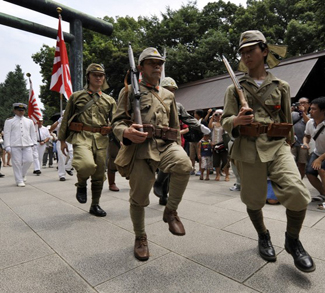FORECAST
The anniversary of Japan’s surrender in WWII has come and gone with two noteworthy developments: no visits from the Japanese cabinet to the Yasukuni Shrine and a strongly-worded apology from Prime Minister Naoto Kan.
Reading between the lines, these developments suggest a continuation of the Democratic Party of Japan’s (DPJ) policy of moving Japan closer to its Asian neighbors and striving to be less dependent on the US-Japan alliance. Recall that the DPJ came to power on Prime Minister Yukio Hatoyama’s promise of relocating the Futenma US military base away from Okinawa. However, the sinking of the Cheonan terminally weakened his stance by highlighting the potential military threats that Japan could be facing in the near future. Eventually, Hatoyama was forced to step down and sacrifice his own political fortunes in able to insulate the US-Japan alliance.
Former Prime Minister Hatoyama’s failure to send a clear signal that Japan is serious about joining Asia has left the Japanese government in somewhat of a compromised position. The whole ordeal proved that when push comes to shove, Tokyo will just fall back on the security blanket of the US-Japan alliance. This is not to say that Prime Minister Kan’s comments or abstention from visiting Yasukuni won’t have a positive influence on Sino-Japanese and ROK-Japanese relations, but rather that the dynamics of Japan’s relationship with Asia have not, and very likely will not, change in the way that the DPJ envisioned when it was swept into power.
There are two reasons why the Japanese government will find it exceedingly difficult to warm up to China in anything more than a strictly economic way. First is the rampant grassroots distrust that exists in both countries. According to a poll conducted by Genron NPO, a Japanese think tank, only 38.3 percent of Chinese people have a positive view of Japan. The number is even lower in Japan, where a mere 27.3 percent of people think of China in positive terms. Though it should be noted that these numbers are slightly better than last year’s, the widespread mistrust that they reveal does not bode well for Sino-Japanese relations. It suggests a high probability that either Tokyo or Beijing could one day take advantage of populist sentiments for domestic political gain. The risk is especially high in China because of the potential for a situation in which economic downturn forces Beijing to lean on populist nationalism to shore up its own support base.
Secondly, there is the fact that the presence of US military power in Asia is worrisome for China, making Japan a strategic liability in the eyes of Beijing. As the PLA and PLA Navy continue to expand in size and capabilities, they will increasingly brush up against the US in Asia. Over the course of this transitional period, regional roles and responsibilities will remain ambiguous, creating mutual apprehension and potential conflict. This is yet another reason why Japanese efforts to cozy up to Beijing are likely be frustrated over the short to medium term.




